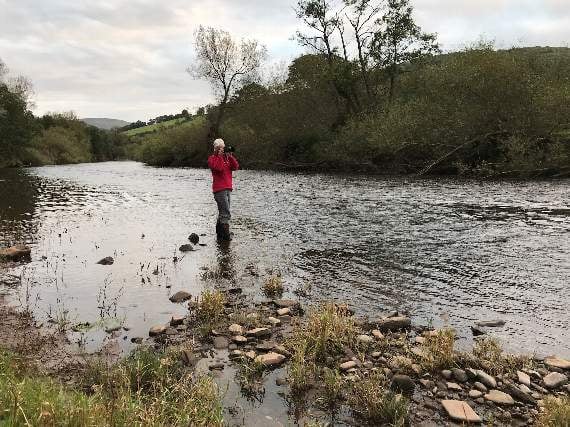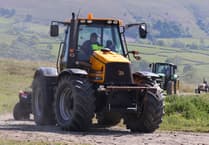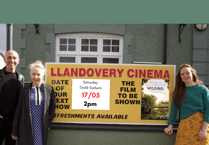Ceri Leigh has been in therapy for the past 10 years since an accident on her way home one day from work left her unable to walk for a year and a half and suffering with post-traumatic stress disorder (PTSD) .
The former Exhibitions Manager at the Natural History Museum in London now suffers with insomnia, severe flashbacks and dissociative paralysing seizures which prevent her from leaving the house unaccompanied and unable to drive a car or cook in case she loses all sense of reality and collapses to the floor.
But the 57-year-old, who now lives in the Usk Valley, has found photographing the beautiful floodplains of the Brecon Beacons the best medicine for calming her anxious brain.
As the coronavirus pandemic spread across the world, Ceri took pictures of the wildlife she watched from her window every day in 2020 – recording a few hundred species – and she has just published a book called ‘Life on the Floodplain.’
The book is a living document of the natural environment during a time of restrictions and lockdowns, providing diary entries of the year the world stood still, alongside pictures of British animals and birds, including Canada geese, woodpeckers, and nuthatches – as nature carried on with life.
Writing the book for Ceri was a step towards her old life and the job that she loved managing exhibitions at one of the UK’s most popular museums.
For a long time, Ceri has felt as if “there is no one in charge of her head” and even the sound of a child crying, or an ambulance siren, can trigger a seizure – the effects of which can last for hours.
But in writing 365 entries in her journal and taking pictures of the landscape, plants, and animals around her with an iPhone, she found comfort from the confusion and disorder of daily life.
Ceri said: “With PTSD nothing makes sense. Piecing your mind back together takes baby steps, over and over, every day. It’s a never-ending battle. You may have no idea of time with PTSD or, like me, often not know where you are and can temporarily be out of touch with reality.
“I fall frequently with the seizures, but I feel nothing as I get a dose of natural anaesthetic with the dissociation. If I fall backwards, there is no feeling and no thoughts – it’s like a computer malfunction, my brain just shuts down.
“But the constant falling is taking its toll on my neck, and other vertebrae are showing painful signs of degeneration.
“Thankfully, the seizures have decreased from several times per day, to several times per week, and after more than a decade, I’m in a better place. But the struggle and fallout has been acute – it’s a shock to the system when your life falls apart in an instant.
Ceri said: “Watching wildlife calms me as I find it has a meditative quality. Taking photographs on my mobile phone distracts me from the anxiety of PTSD and it grounds me. I encourage everyone to observe their own environment, as even in cities, nature is present. It’s surprising how much wildlife can be seen if you take the time to tune in and look around.”





Comments
This article has no comments yet. Be the first to leave a comment.